Pregnancy is the best experience of a woman’s life where she pays utmost attention to the food items she eats. Are you an expectant mother? If you are searching for the good foods to be consumed during the pregnancy, here you need to know about saffron.
Saffron, being one of the world’s most expensive spices, well known spice to be consumed during pregnancy over the generations. There are many beliefs surrounding the use of saffron that will be discussed in this article.
This article discusses the benefits and side effects of saffron. It presents ways to consume saffron during pregnancy.
What is Saffron?
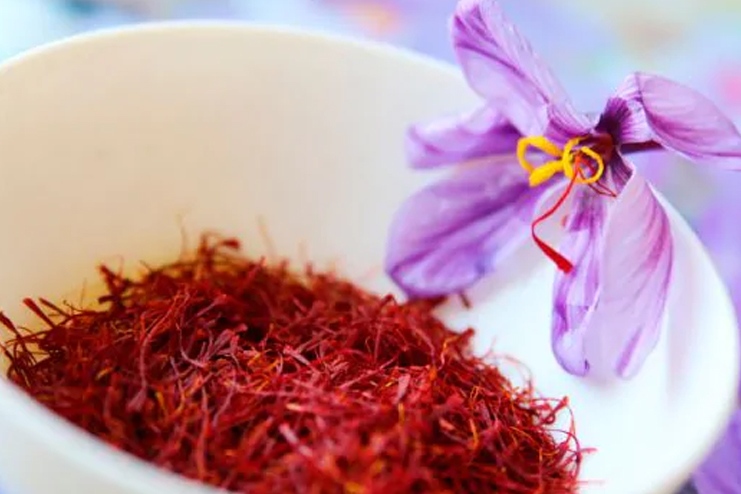
Saffron is a small, bulbous, perennial spice derived from the flower of Crocus Sativus. It is used as both a spice and medicine. A lot of effort and labor is invested behind the preparation of these saffron strands. 75,000 saffron flowers make about 1 pound of saffron. This might make the saffron the most expensive spice. It was first cultivated in Greece. This herb is produced in Kashmir valley in Indian and is always in high demand.
It is regarded as ‘The Golden Spice’. It gives a rich flavor and golden yellow shade to the dishes.
Why Saffron During Pregnancy?

In many cultures, it is believed that saffron increases the complexity of your baby in the womb. Many adults give woman milk infused with saffron during pregnancy for the baby fair. But, there is no scientific evidence to prove this. The complexion of the baby depends on the hereditary, genes and melanin amount in the skin.
Pregnancy changes the physical and mental well being to a greater extent. Saffron is well known to deal with mood swings during pregnancy. Its medicinal qualities allow you to tackle the symptoms during pregnancy.
Is It Safe to Consume Saffron During Pregnant?
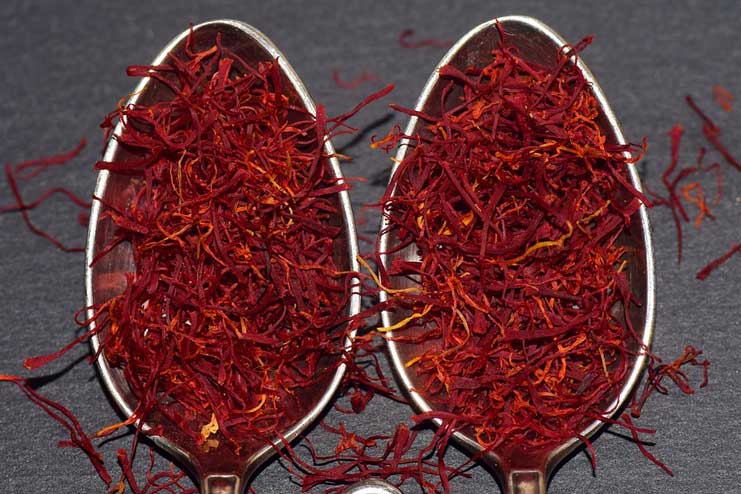
Even though saffron yields many benefits, it’s excessive consumption may lead to undesirable issues and may cause miscarriage in the extreme cases. If consumed in large doses, it results in anxiety, upset stomach, sleepiness. Limit the dose of saffron to protect your baby and yourself from the adverse effects.
The excessive consumption of saffron leads to severe issues like uterine contractions, bleeding, miscarriage, and premature births. Make sure that saffron consumption may not exceed 20-30 mg per day.
Is Saffron Good For Baby?

There is no scientific evidence to support the myth that saffron increases the complexity of the baby in the womb. Baby’s skin tone depends on the genetic makeup of their parents. Any supplements are unlikely to change and affect the natural skin complexion of the baby in the womb.
Benefits Of Saffron During Pregnancy:

Saffron is rich in chemicals that help in altering the mood, kills cancer cells, decreases swelling and act as antioxidants.
The right amounts of saffron help to deal with the discomforts during the pregnancy. Here are a few uses of taking saffron during pregnancy.
1. Reduces Blood Pressure:
High blood pressure is a common issue in the expectant mothers. 3-4 strands of saffron consumption through the milk helps to reduce the blood pressure. It relaxes muscles and acts as a uterine stimulant. Women with low blood pressure are not recommended to use saffron as it further lowers the blood pressure.
2. Controls Mood Swings:
Hormonal changes may make you more vulnerable to mood swings during pregnancy. It increases the production of serotonin hormone in the brain by stimulating the blood flow to the brain.
This hormone will make you feel relaxed. Its antidepressant properties make you stay active. It helps to combat morning sickness.
3. Improves Digestion:
Many pregnant women complain about improper digestion including constipation, bloating during pregnancy. Saffron enhances metabolism thereby helps in improving digestion.
Regular intake of saffron helps in dealing with intestine related gastric issues by forming a protective layer coating inside the intestine.
4. Fights Against Anemia:
Anemia leaves you in a situation, where your blood does not have enough red blood cells to carry oxygen to your tissues and to your baby.
Most pregnant women experience anemia in the later stages of the pregnancy. Saffron helps in combating this situation as it is rich in iron and other essentials that help in building the red blood cells.
5. Fights Allergies:
Pregnancy makes you more prone to allergies like coughing, sneezing, itching, and runny nose. Milk with 3-4 strands of saffron helps in soothing the allergic conditions.
6. Keeps Hair Fall Under Control:
Most of the women experience hair fall during pregnancy due to hormonal imbalances and vitamin deficiency. Saffron can be used to reduce hair fall intensity.
Make out the paste from the saffron, milk, and licorice and apply it on the scalp which helps in preventing the hair fall and stimulating hair growth.
7. Promotes Sleep:
Insomnia is the most common sleep discomfort that pregnant women experience. Many different factors like hormonal changes, frequent trips to the bathroom, and leg cramps contribute to sleepless nights.
Having a small cup of saffron milk works well as a sedative and helps promote sleep.
8. Soothes the Cramps:
Pregnant women may experience cramps with the intensity ranging from mild to severe due to stretching and shifting of the muscles to accommodate the growing baby.
Saffron, being the natural pain killer helps soothe the stomach pain and cramps.
9. Protects against Heart Disease:
Pregnancy increases the appetite levels of women and makes them eat more. The overeating and excessive consumption of fats may affect the functioning of their cardiovascular system.
Saffron is the rich source of antioxidants, crocetin, and potassium makes it reduce triglyceride and cholesterol levels in your body.
10. Cures Respiratory Illness:
Anti inflammatory properties in the saffron makes the nasal airways wider. It protects the lungs from being affected by swelling and inflammation making you breathe clearly.
Saffron also helps women with asthma by removing any blockage that is present in the lungs and trachea.
11. Protects Skin:
Breakouts, dry skin, and black spots are the most common experiences that pregnant women may face. Saffron masks will work well to repair the damaged skin cells and nourish your skin.
Here are the few benefits of saffron for the skin:
12. Helps Easy Labor:
As saffron affects the uterine contractions it is believed to aid the cervical ripening thereby making easing the labor process.
13. Relieves Sore Gums:
Sore gums is one of the common symptoms during the pregnancy. It makes the brushing more difficult.
Grind the saffron strands and massage it gently over the gums to relieve the pain and to avoid bleeding.
14. Baby Movements:
Pregnant women can feel the baby movement after having a glass of milk with strands of saffron. You can feel the baby’s movements as the saffron increases the body’s heat. Baby movements can be felt only after a few months.
When To Consume Saffron During Pregnancy?
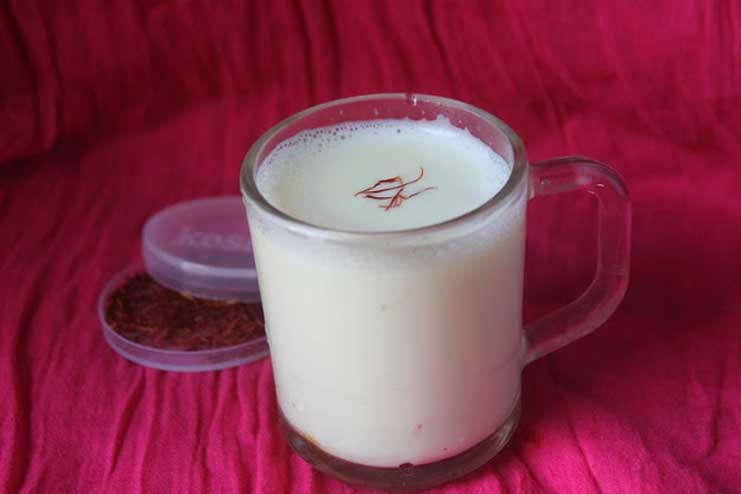
Saffron aids in the proper digestion and it is the appetite booster. It is recommended to consult your doctor on when to start and how much to consume to get the better results.
It is most advisable to start consuming the recommended levels of saffron from the second trimester Because it is assumed to be a stable period of the pregnancy. The common initial discomforts of pregnancy like nausea, vomiting may calm down in the second trimester.
Introducing the new food items in your diet during the first trimester may further increase the severity of discomfort. Eating saffron during pregnancy increases the body heat which in turn enhances the uterine contractions. Contractions may result in miscarriage. It is recommended to take just a couple of strands contributing to 20 to 30 mg a day.
How to Consume Saffron During Pregnancy:
Here are a few ways of consuming saffron during pregnancy
1. Saffron With Milk:

Calcium present in the milk is very important for the development of your baby and it helps in nourishing your bones as well. Add a couple of saffron strands from the fifth month of your pregnancy.
You can also add the paste of almonds, pistachios and saffron strands to the milk.
2. Saffron With Other Dishes:

You can consume the saffron by adding it to the dishes like rice, soups and other dishes without exceeding the safe limit.
3. Saffron With Water:
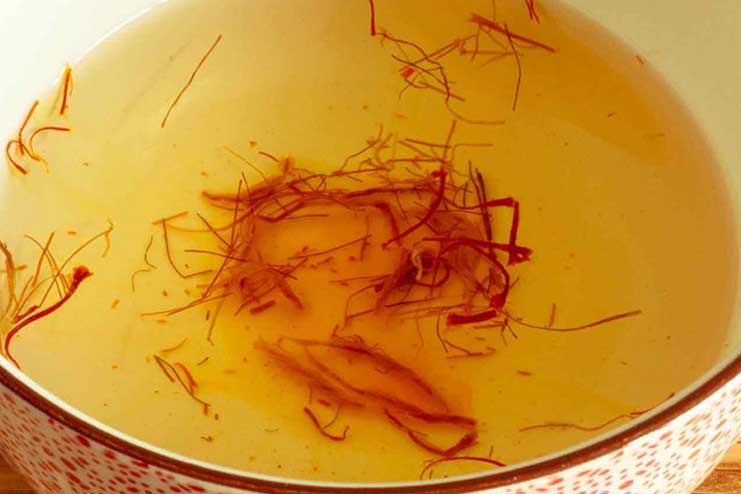
Add a couple of strands of saffron to the drinking water and consume it. It enhances digestion.
4. Crumbled Saffron:
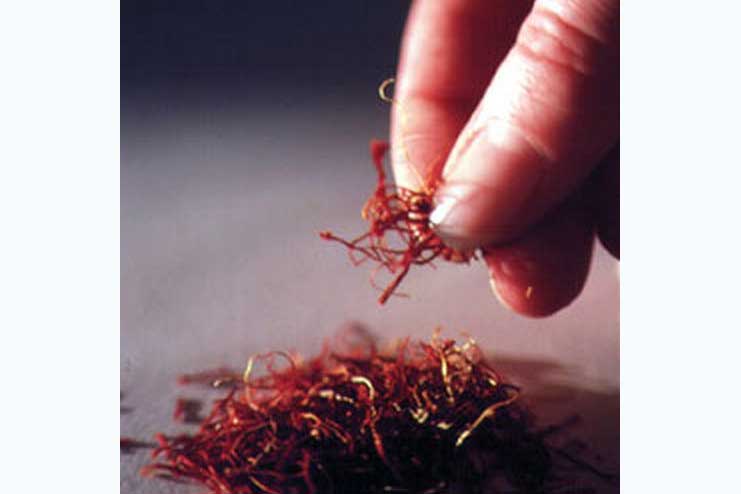
Crumbled saffron can be used as a dressing in nutritious salads and soups. Crumble the saffron with your fingers and sprinkle it as a topping.
Saffron can also be used in combination with the sweets.
5. Soaked Saffron:
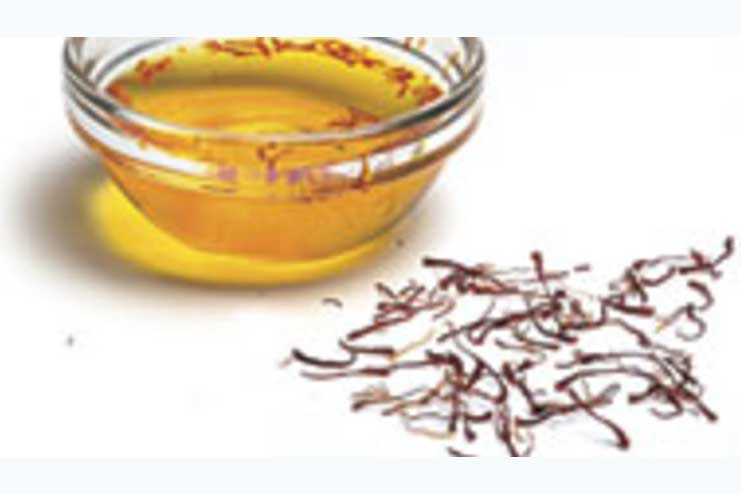
Gently crumb the saffron and add it to the water. Allow it soak for about 10-15 minutes before being consumed or added to the recipe.
Side Effects of Saffron During Pregnancy:

Side effects occur when you consume saffron beyond the recommended safe level:
1. Premature Labour or miscarriages:
Increased intake of saffron may stimulate the uterus contractions leading to premature labor and miscarriages.
2. Hypersensitivity:
Many pregnant women complain about anxiety, dry mouth, and nausea of consuming saffron. Check with your midwife and avoid saffron.
3. Vomiting:
It is one of the side effects of saffron. Vomiting makes you feel tired, dehydrated and it may lead to the loss of vital nutrients.
4. Numbness:
Numbness results from the consumption of excess amounts of saffron. It is an itchy sensation that occurs in the hands, feet, eyelids, and lips.
5. Blood in Urine and Stools:
If you notice blood in the urine, it could be a sign of a urinary tract infection. A high intake of saffron may cause blood in the urine and stools.
6. Jaundice/Diarrhea:
Excess amounts of saffron intake result in the toxic reactions in the body thereby leading to conditions like jaundice, diarrhea, etc.
7. Bleeding From Eye Lids, Nose or Lips:
Experience of allergies due to saffron consumption may vary depending on the stage of pregnancy. Women may experience possible complications like bleeding from nose, lips, or eyelids.
8. Saffron Poisoning:
This condition occurs if you consume more amounts of saffron. The symptoms of overdose may include yellowness of the skin, eyes and mucus membrane, numbness, bloody diarrhea, nose, and lips bleeding.
9. Dizziness:
Saffron is well known for its sedative properties. May lead to dizziness if consumed in excessive amounts.
10.Allergies:
Women who have an allergic history towards certain herbal plants like Olea, Lolium, and Sasola are at the risk of being allergic to saffron.
Tips While Taking Saffron During the Pregnancy:

Here are a few tips to follow while consuming the saffron during the pregnancy for the safer benefits:
- Start consuming saffron at the beginning of the 5th month of the pregnancy.
- Check for purity before consuming to avoid any risk of artificial coloring or impurities.
- Do not exceed the safe limit of 2-3 strands while adding in any recipe.
- Store the saffron in a clean and dry container
Pregnancy is a very crucial stage and it is very important to know what is good and what is bad. It is very important to know that even the foods with rich nutritious values may harm when consumed in excess amounts, saffron is one among those. This article will guide you in the proper consumption of saffron during pregnancy.







































